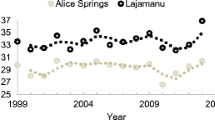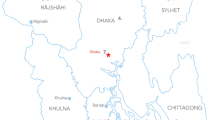Abstract
Earth’s climate has changed throughout history and regional changes in climate have already affected a diverse set of physical and biological systems in many parts of the world. The impacts depend on community’s vulnerability and exposure conditions, and mitigation and adaptation actions have been recognized as essential to meet the goals of global agendas (e.g., New Urban Agenda, Sustainable Development Goals and Sendai Framework). Adaptation measures seem to be less common compared to mitigation ones, probably for the limits on ecological, physical, economic, and technological dimensions. The objective of this study, conducted as part of the Interreg RESPONSe Project, is to analyze the resilience of local population in the Veneto Region in relation to the integration in the territory. Hence, the investigation focused on analyzing the locals’ perception of climate impacts on their daily life, their sense of place, and how perception and sense of place influence the willingness to take personal and collective actions to counteract climate change. Social and physical characteristics, local climate change scenarios, and the targeted adaptation approach of different communities have been examined. Results suggest that age and proximity to the coast are influencing factors in the response to climate change. For instance, younger people appear to acknowledge the shared personal responsibility of tackling such a challenge, while wishing for a broader community involvement. At the same time, the sense of belonging appears to support long-term, adaptation actions. Overall, the outcomes give hints about the key elements to consider when planning for improving local climate resilience.
Access this chapter
Tax calculation will be finalised at checkout
Purchases are for personal use only
Similar content being viewed by others
Notes
- 1.
The questions are contained in different sections of the questionnaire (Q8 and Q9 – Risk perception; Q25 – Risk acceptance; Q28 and Q29 – Attitude towards risks and, for the scope of the chapter, are collected under the appellation “sense of belonging”.
References
Adger W, Agrawala NS, Mirza MMQ, Conde C, O’Brien K, Pulhin J, Pulwarty R, Smit B, Takahashi K (2007) Assessment of adaptation practices, options, constraints and capacity. In: Parry ML, Canziani OF, Palutikof JP, van der Linden PJ, Hanson CE (eds) Climate change 2007: impacts, adaptation and vulnerability. contribution of working group ii to the fourth assessment report of the intergovernmental panel on climate change. Cambridge University Press, Cambridge, UK, pp 717–743. https://doi.org/10.1007/978-1-349-02250-2_5
Biesbroek GR, Klostermann JEM, Termeer CJAM, Kabat P (2013) On the nature of barriers to climate change adaptation. Reg Environ Change 13(5):1119–1129. https://doi.org/10.1007/s10113-013-0421-y
Bowden V, Nyberg D, Wright C (2019) Planning for the past: local temporality and the construction of denial in climate change adaptation. Glob Environ Change 57:101939. https://doi.org/10.1016/j.gloenvcha.2019.101939
Brulle RJ, Norgaard KM (2019) Avoiding cultural trauma: climate change and social inertia. Environ Politics 28(5):886–908. https://doi.org/10.1080/09644016.2018.1562138
Cunsolo Willox A, Harper SL, Ford JD, Landman K, Houle K, Edge VL (2012) “From this place and of this place:” climate change, sense of place, and health in Nunatsiavut, canada. Soc Sci Med 75(3):538–547. https://doi.org/10.1016/j.socscimed.2012.03.043
Denton F, Wilbanks TJ, Abeysinghe AC, Burton I, Gao Q, Lemos MC, Masui T, O’Brien KL, Warner K (2014) Climate-resilient pathways: adaptation, mitigation, and sustainable development. In: Field CB, Barros VR, Dokken DJ, Mach KJ, Mastrandrea MD, Bilir TE, Chatterjee M, Ebi KL, Estrada YO, Genova RC, Girma B, Kissel ES, Levy AN, MacCracken S, Mastrandrea PR, White LL (eds) Climate change 2014: impacts, adaptation, and vulnerability. Part A: global and sectoral aspects. Contribution of working group II to the fifth assessment report of the intergovernmental panel on climate change. Cambridge University Press, Cambridge, United Kingdom and New York, NY, USA, pp 1101–1131
Devine-Wright P (2013) Think global, act local? The relevance of place attachments and place identities in a climate changed world. Glob Environ Chang 23(1):61–69. https://doi.org/10.1016/j.gloenvcha.2012.08.003
Devine-Wright P, Price J, Leviston Z (2015) My country or my planet? Exploring the influence of multiple place attachments and ideological beliefs upon climate change attitudes and opinions. Glob Environ Chang 30:68–79. https://doi.org/10.1016/j.gloenvcha.2014.10.012
Eriksen SH, Nightingale AJ, Eakin H (2015) Reframing adaptation: the political nature of climate change adaptation. Glob Environ Chang 35:523–533. https://doi.org/10.1016/j.gloenvcha.2015.09.014
Feitelson E (1991) Sharing the globe. The role of attachment to place. Glob Environ Change 1(5):396–406. https://doi.org/10.1016/0959-3780(91)90005-E
Hryniewicz O (2006) Goodman-Kruskal γ measure of dependence for fuzzy ordered categorical data. Comput Stat Data Anal 51(1):323–334. https://doi.org/10.1016/j.csda.2006.04.014
IPCC (2021) Summary for Policymakers. In: Climate Change 2021: The Physical Science Basis. Contribution of Working Group I to the Sixth Assessment Report of the Intergovernmental Panel on Climate Change [Masson-Delmotte, V., P. Zhai, A. Pirani, S.L. Connors, C. Péan, S. Berger, N. Caud, Y. Chen, L. Goldfarb, M.I. Gomis, M. Huang, K. Leitzell, E. Lonnoy, J.B.R. Matthews, T.K. Maycock, T. Waterfield, O. Yelekçi, R. Yu, and B. Zhou (eds.)]. Cambridge University Press, Cambridge, United Kingdom and New York, NY, USA, pp 3−32. https://doi.org/10.1017/9781009157896.001
IPCC (2022) Summary for Policymakers [H.-O. Pörtner, D.C. Roberts, E.S. Poloczanska, K. Mintenbeck, M. Tignor, A. Alegría, M. Craig, S. Langsdorf, S. Löschke, V. Möller, A. Okem (eds.)]. In: Climate Change 2022: Impacts, Adaptation, and Vulnerability. Contribution of Working Group II to the Sixth Assessment Report of the Intergovernmental Panel on Climate Change [H.-O. Pörtner, D.C. Roberts, M. Tignor, E.S. Poloczanska, K. Mintenbeck, A. Alegría, M. Craig, S. Langsdorf, S. Löschke, V. Möller, A. Okem, B. Rama (eds.)]. Cambridge University Press, Cambridge, UK and New York, NY, USA, pp 3–33. https://doi.org/10.1017/9781009325844.001
IPCC (2022) Summary for Policymakers. In: Climate Change 2022: Mitigation of Climate Change. Contribution of Working Group III to the Sixth Assessment Report of the Intergovernmental Panel on Climate Change [P.R. Shukla, J. Skea, R. Slade, A. Al Khourdajie, R. van Diemen, D. McCollum, M. Pathak, S. Some, P. Vyas, R. Fradera, M. Belkacemi, A. Hasija, G. Lisboa, S. Luz, J. Malley, (eds.)]. Cambridge University Press, Cambridge, UK and New York, NY, USA. https://doi.org/10.1017/9781009157926.001
Istat. (n.d.). Demografia in cifre
Istituto Nazionale di Statistica (2021) Popolazione residente al 1° gennaio. Retrieved 4 June 2021, from http://dati.istat.it/Index.aspx?DataSetCode=DCIS_POPRES1
Mchugh ML (2013) The chi-square test of independence lessons in biostatistics. Biochemia Medica 23(2):143–149. Retrieved from https://doi.org/10.11613/BM.2013.018
Moser A (1952) Quota sampling. Soc Roy Stat 115(3):411–423
Osservatorio Veneti nel Mondo (2021) Comprendere il fenomeno guardando al futuro Percorsi di approfondimento sul le relazioni familiari transnazionali, il ruolo delle imprese e gli effetti della Brexit Report di ricerca. Venezia-Mestre
Porter JJ, Demeritt D, Dessai S (2015) The right stuff? Informing adaptation to climate change in British Local Government. Glob Environ Chang 35:411–422. https://doi.org/10.1016/j.gloenvcha.2015.10.004
Regione Veneto (2007) P.R.S. Programma regionale di Sviluppo
Scannell L, Gifford R (2010) Defining place attachment: a tripartite organizing framework. J Environ Psychol 30(1):1–10. https://doi.org/10.1016/j.jenvp.2009.09.006
Simms JRZ (2017) “Why would I live anyplace else?”: resilience sense of place and possibilities of migration in Coastal Louisiana. J Coastal Res 33(2):408–420. https://doi.org/10.2112/JCOASTRES-D-15-00193.1
Tacoli C (2009) Crisis or adaptation? Migration and climate change in a context of high mobility. Environ Urban 21(2):513–525. https://doi.org/10.1177/0956247809342182
UNDRR (2015) Sendai Framework for Disaster Risk Reduction 2015-2030. Geneva, Switzerland. Available at: https://www.undrr.org/publication/sendai-framework-disaster-risk-reduction-2015-2030
Warner K, Hamza M, Oliver-Smith A, Renaud F, Julca A (2010) Climate change, environmental degradation and migration. Nat Hazards 55(3):689–715. https://doi.org/10.1007/s11069-009-9419-7
Acknowledgements
This research was funded by the EU Italy-Croatia Interreg program through the RESPONSe project (ID 10046849).
Author information
Authors and Affiliations
Corresponding author
Editor information
Editors and Affiliations
Rights and permissions
Copyright information
© 2023 The Author(s), under exclusive license to Springer Nature Singapore Pte Ltd.
About this chapter
Cite this chapter
Casareale, C., Marchetti, N., Colocci, A. (2023). Sense of Belonging and Response to Climate Change: How the Relation with Local Territories Influences Climate Resilience. In: Dahiya, B., de Pascale, F., De Pietro, O., Farabollini, P., Lugeri, F.R., Mercatanti, L. (eds) Disaster Resilience and Human Settlements. Advances in 21st Century Human Settlements. Springer, Singapore. https://doi.org/10.1007/978-981-99-2248-2_13
Download citation
DOI: https://doi.org/10.1007/978-981-99-2248-2_13
Published:
Publisher Name: Springer, Singapore
Print ISBN: 978-981-99-2247-5
Online ISBN: 978-981-99-2248-2
eBook Packages: Earth and Environmental ScienceEarth and Environmental Science (R0)




